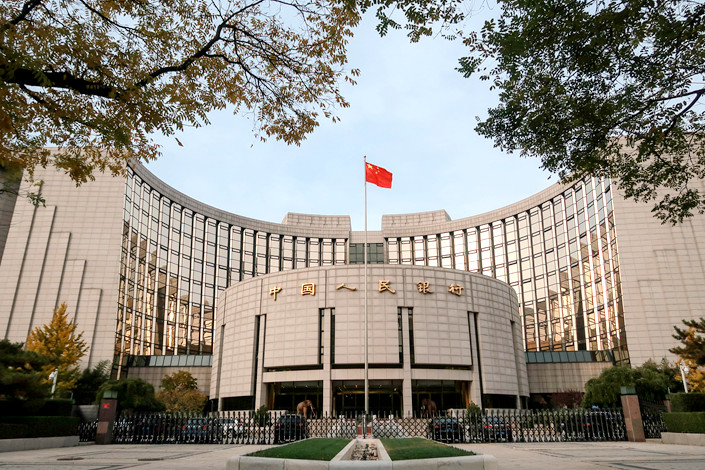Central Bank Official Downplays Chances of Credit Binge

China’s central bank has again downplayed the prospect of aggressive monetary loosening, with a senior official emphasizing that the credit valves will be adjusted in a “measured” way.
“(We) will fully take into account new changes in the economic and financial situation to fine-tune (policies), but we will do this in a measured manner and firmly avoid flooding the economy (with credit),” Wang Jingwu, head of the Financial Stability Bureau of the People’s Bank of China (PBOC), said in an interview with the Financial News, a newspaper run by the monetary authority. The bureau is responsible for guarding against systemic risks in the financial system.
“(We) will keep a close eye on and carry out a dynamic assessment of market liquidity and factors affecting it, and be vigilant against the formation of a ‘liquidity delusion’ and expectations of one-way (moves in the monetary policy) among market participants,” he said.
Wang’s comments, published Thursday, underscore the government’s concern that record lending in January is fueling expectations of a renewed lending binge as policymakers walk a tightrope between boosting economic growth and curbing financial risks.
Over the past year, the PBOC has implemented a series of measures to improve market liquidity and encourage bank lending, even as it has continued a crackdown on the shadow banking sector. It has made five cuts in the amount of cash commercial banks must set aside as reserves, releasing funds that can be used to make loans. The moves were also aimed at ensuring market liquidity at a time when banks were slashing off-balance-sheet lending as regulators tightened rules as part of an official campaign to tackle the country’s mounting debt problem, control financial risks and stop localized problems from turning into a systemic financial crisis.
Rising expectations
The government has specifically urged banks to give more credit to small and private companies to bolster an economy that’s being hit simultaneously by cooling domestic demand and the China-U.S. trade war.
These measures have stoked market expectations that the government will turn to more powerful measures such as a reduction in benchmark interest rates to support economic growth that is projected to weaken further this year.
But the central bank has been reluctant to make such a move and repeatedly said that it would keep monetary policy “prudent and stable.” The bank considers the country’s interest rates to be at a relatively low level and aims to “avoid excessive monetary easing,” according to a PBOC research report published by the Financial News last week. China hasn’t changed its benchmark rates since 2015, although it has reduced rates in the interbank market.
China’s growth has long been driven by credit-fueled investment, which has led to a rapid increase in debt over the past decade. The country’s total debt-to-GDP ratio jumped to 253.1% as of June 2018 from 138.4% at the end of 2008, data from the Bank for International Settlements show.
The government, concerned that debt problems could spiral out of control and trigger a banking crisis that could undermine social stability, initiated a deleveraging campaign more than two years ago targeted at the financial sector, local governments and inefficient, money-losing state-owned enterprises (SOEs).
The trade spat with the U.S. and the country’s weakening economic growth have forced Beijing to slow the pace of deleveraging, but authorities have insisted that the campaign will continue in order to bring down debt ratios in the government and corporate sectors.
In his interview, Wang also pledged that regulators will continue efforts to force SOEs to deleverage, prevent households debt levels from surging, and “firmly contain” further increases in local governments’ unofficial borrowings while effectively reducing existing liabilities.
He pointed to a number of key challenges facing the economy including the yuan exchange rate and the potential impact on the domestic economy of uncertainties stemming from outside the country, such as intensifying global trade tensions due to protectionist policies by the U.S. Wang also highlighted risks in regional property markets that may spill over to affect financial institutions. Some financial conglomerates, rural financial institutions and online lenders are also exposed to risks that could spread to the wider financial system, he said.
Contact reporter Fran Wang (fangwang@caixin.com)

- 1Cover Story: China Carves Out a Narrow Path for Offshore Asset Tokenization
- 2Drownings Shake Chinese Enthusiasm for Travel to Russia
- 3Over Half of China’s Provinces Cut Revenue Targets
- 4Li Ka-Shing’s Port Empire Hit by Forced Takeover Amid Panama Legal Dispute
- 5In Depth: China’s Mutual Fund Industry Faces Overhaul After a Banner 2025
- 1Power To The People: Pintec Serves A Booming Consumer Class
- 2Largest hotel group in Europe accepts UnionPay
- 3UnionPay mobile QuickPass debuts in Hong Kong
- 4UnionPay International launches premium catering privilege U Dining Collection
- 5UnionPay International’s U Plan has covered over 1600 stores overseas






